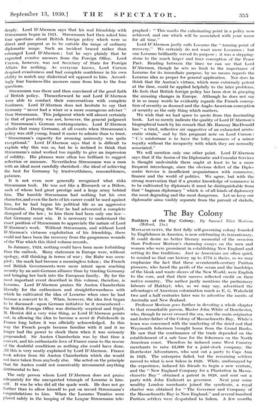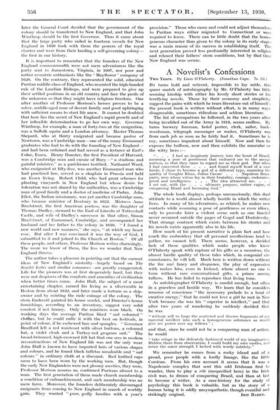The Bay Colony
Builders of the Bay Colony. By Samuel Eliot Morison. (Milford, 21s.) MASSACHUSETTS, the first fully self-governing colony founded by Englishmen in America, is now celebrating its tercentenary. It could desire no better literary memorial of the occasion than Professor Morison's charming essays on the men and women who were prominent in establishing New England and setting its fine traditions. Just as Americans are often quick to remind us that our history up to 1776 is theirs, so we may emphasize the fact that these seventeenth-century Puritan pioneers, who faced the perils of the ocean and the hardships of the bleak and waste shores of the New World, were English to the core, and that their success reflected credit on their native country. The author justly mentions the preliminary labours of Hakluyt, who, as we may say, advertised the advantages of American colonization much as E. G. Wakefield two and a half centuries later was to advertise the merits of Australia and New Zealand.
Professor Morison goes further in devoting a whole chapter to that remarkable parson, Master John White of Dorchester, who, though lie never crossed the sea, was the main originator and foster-father of the Colony of Massachusetts Bay. White's town was concerned with the marketing of the dried cod that Weymouth fishermen brought home from the Grand Banks. He saw that the continuance of the trade depended on the establishment of a safe base for the fishermen on the North American coast. Therefore lie induced some West Country merchants to raise £3,000 for a joint-stock company, the Dorchester Adventurers, who sent out a party to Cape Ann in 1623. The enterprise failed, but the remaining settlers moved to what is now Salem in 1626. White, undismayed by the experience, induced his friends to begin a new venture, and the " New England Company for a Plantation in Massa- chusetts Bay " obtained a patent in 1628, and sent out a party with John Endecott as governor. Next year some wealthy London merchants joined the syndicate, a royal charter was obtained for " The Governor and Company of the Massachusetts Bay in New England," and several hundred Puritan settlers were despatched to Salem. A few months
later the General Court decided that the government of the colony should be transferred to New England, and that John Winthrop should be the first Governor. Thus it came about that the large party who sailed in fourteen vessels for New England in 1630 took with them the powers of the royal charter and were from their landing a self-governing colony— the first in our history.
It is important to remember that the founders of the New England commonwealth were not mere adventurers like the party sent to Jamestown, Virginia, in 1607, nor poor and rather eccentric enthusiasts like the ' Mayflower' company of 1620. On the contrary, they represented the solid, educated Puritan middle-class of England, who resented the high-handed rule of the Laudian Bishops, and were prepared to give up their settled positions in an old country and face the perils of the unknown so that they might have religious freedom. One after another of Professor Morison's heroes proves to be a sober, middle-aged man of decent family and good upbringing with sufficient means to start life anew. It cannot be doubted that here lies the secret of New England's rapid growth and of her inflexible determination to go her own way. Governor Winthrop, for example, a man of forty-two at the emigration, was a Suffolk squire and a London attorney. Master Thomas Shepard, who at thirty emigrated and became pastor of Newtown, was a Cambridge man—one of the many Emmanuel graduates who had to do with the founding of New England— and had been ordained and had served as a lecturer at Earl's Cane, Essex. Henry Dunster, the first President of Harvard, was a Cambridge man and curate of Bury—" a studious and painful minister," as a parishioner testified. Nathaniel Ward, who emigrated at fifty-five, was another Emmanuel man who had practised law, served as a chaplain in Prussia and held an Essex living. Robert Child, who had great schemes for planting vineyards in New England but whose desire for toleration was not shared by the authorities, was a Cambridge man of good family and a doctor of medicine of Padua. .John Eliot, the Indian missionary, was yet another Cambridge man, who became minister of Roxbury in 1632. Mistress Anne Bradstreet, the first American poetess, was the daughter of Thomas Dudley, steward to the Earl of Lincoln at Tattershall Castle, and wife of Dudley's successor in that office, Simon Bradstreet, of Emmanuel, Cambridge, and accompanied her husband and her father to the colony in 1630. " I found a new world and new manners," she says, " at which my heart rose. But after I was convinced it was the way of God, I submitted to it and joined to the Church at Boston." Of all these people, and others, Professor Morison writes charmingly. The more we know of them, the less we wonder that New England throve.
The author takes a pleasure in pointing out that the current ideas of New England's austerity—largely based on The Scarlet Letter and similar romances—are greatly exaggerated. Life for the pioneers was .at first desperately hard, but they were not despisers of the comforts and amenities of civilization when better times came. John Hull, the subject of a most entertaining chapter, earned his living as a silversmith in Boston from about 1642, and later made a fortune as a ship- owner and by minting the rude coinage of the colony. The stern Endceott painted his house scarlet, and Dunster's house furnishings, according to an inventory, suggest very solid comfort if not luxury. Only the ministers wore black. On working days the average Puritan liked " sad coloured " clothes, but he could ruffle it with the best on festivals, in point of colour, if he eschewed lace and spangles. " Governor Bradford left a red waistcoat with silver buttons, a coloured hat, a violet cloak and a Turkey-red grogram suit." The broad-brimmed, high-crowned felt hat that one sees in modern reconstructions of New England life was not the only wear John Hull is known to have imported hats of various shapes and colours, and he found black taffetas unsaleable and " sad colours " in ordinary cloth at a discount. Red knitted caps seem to have been worn by the working men. But, though the early New Englanders were not gloomy ascetics, they were, Professor Morison assures us, confirmed Puritans almost to a man. The first generation of them made church. membership a condition of enfranchisement, and such membership was np mere farce. Moreover, the founders deliberately discouraged emigrants from coming to New England in search of worldly pin. They wanted " poor, godly families with a year's provision." Those who came and could not adjust themselves to Puritan ways either migrated to Connecticut or were required to leave. There can be little doubt that the homo- geneous character thus given to the colony in its early stages was a main reason of its success in establishing itself. The next generation proved less profoundly interested in religion and relaxed their fathers' stern conditions, but by that time New England was secure.











































 Previous page
Previous page